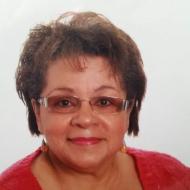Academy Council Information
-
Adrienne Cluer
Pupil premium -
Geraldine (Gerrie) Ozah
Special Educational Needs and Safeguarding -
Roisin Chapman
Staff MAC -
Elaine Baldry
Diversity and Inclusion -
Jo Waters
Head of School; Ex-Officio -
Sarah Farthing
-
Leana Anthony

Adrienne Cluer
Responsibilities:
Pupil premium
Retired drama & English teacher with over 30 years’ experience of teaching in Croydon comprehensives- 10 years of which was in Thornton Heath. Strong commitment to education for all, that is both challenging & fun. Recently becoming a grandparent has reinforced my understanding of the needs of every individual child & family.

Geraldine (Gerrie) Ozah
Responsibilities:
Special Educational Needs and Safeguarding
I became a MAC in July 2014 as I live locally and worked for over fourteen years nearby at Parchmore Community Centre as a Community Development Worker. There has long been a special relationship between the Centre and Bthe school and I often attended school assemblies, Harvest and Christmas celebrations. Now I am able to contribute further as a MAC and am pleased to be able to support the school in this way.
I have a special interest in education, having trained as a teacher and worked as an Educational Psychologist for a number of years.
I enjoy reading and travelling in my spare time. My aim is to work with the school to help the school become the best it can be, to give each of our children a solid educational foundation while assisting them to develop their full potential.
I am also a Governor at the Archbishop Lanfranc Academy.

Roisin Chapman
Responsibilities:
Staff MAC

Elaine Baldry
Responsibilities:
Diversity and Inclusion

Jo Waters
Responsibilities:
Head of School; Ex-Officio

Sarah Farthing

Leana Anthony
Frequently asked questions about Academy Councils
Pegasus is a Multi Academy Trust (MAT), governed overall by a Board of Directors and then a separate Academy Council for each school.
What is a MAC?
The three letters stand for ‘Member of the Academy Council’
What is the Academy Council?
The Academy Council consists of:
- Up to 5 x Community MACs
- 2 x Staff MACs
- Heads of School
- Up to 4 x Parent MACs
- Up to 2 x Board Representatives.
Alongside the heads of School the Academy Council is responsible for monitoring key aspects of each school’s performance – specifically:
- Outcomes for children and learners;
- Quality of teaching, learning and assessment;
- Behaviour and welfare (including safeguarding)
What does a MAC do?
A Member of the Academy Council (MAC) acts as a school governor, though there are differences: For example, in the Pegasus Academy Trust MACs don’t have any financial responsibilities as the executive group have this responsibility. MACs act as ‘critical friend’ to the school, supporting governance and strategy. Parent MACs specifically represent the parents of the school. A MAC may have responsibility for a particular year group and area, for example Pupil Premium or Safeguarding.
How do I become a MAC?
Parent MACs are elected for a four year period and fresh elections take place whenever terms expire. Community MACs are appointed by the Academy Council themselves and may be local councillors etc. (not normally parents). Staff elect their own representatives.
How can I contact a MAC?
You can contact MACs via the school e-mail address marked ‘For attention of [name of governor] or speak to any of us (photos above) on the playgrounds before or after school
RESPONSIBILITIES OF THE ACADEMY COUNCIL
Each school in the Trust has its own Academy Council. The Academy Council is responsible for monitoring key aspects of each school’s performance namely:
- Outcomes for children and learners;
- Quality of teaching, learning and assessment;
- Behaviour and welfare (including safeguarding);
- Ethos and values (and how they match the Trust’s overall values statements)
Members of the Academy Councils (MACs) are expected to establish for themselves what is happening in their schools and to ensure that they receive evidence on these key aspects from a variety of sources. A budget is set aside by Directors so that, when required, Academy Councils may commission their own consultants to give an independent view on areas of concern.
Academy Councils (sometimes known as ‘Local Governing Bodies’) are vital to Directors in ensuring that local voices are properly heard and the have the right to escalate matters to Directors if they vote to do so. Since the formation of the Trust at least one Director has attended each Academy Council so that a quick response can be given where required.












